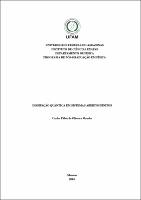| ???jsp.display-item.social.title??? |


|
Please use this identifier to cite or link to this item:
https://tede.ufam.edu.br/handle/tede/4255| ???metadata.dc.type???: | Dissertação |
| Title: | Dissipação quântica em sistemas abertos finitos |
| ???metadata.dc.creator???: | Mendes, Carlos Fábio de Oliveira  |
| ???metadata.dc.contributor.advisor1???: | Galiceanu, Mircea Daniel |
| ???metadata.dc.contributor.referee1???: | Beims, Marcus Werner |
| ???metadata.dc.contributor.referee2???: | Frota, Hidembergue Ordozgoith da |
| ???metadata.dc.contributor.referee3???: | Galiceanu, Mircea Daniel |
| ???metadata.dc.description.resumo???: | Neste trabalho consideramos o aspecto dinâmico de sistemas quânticos abertos onde uma partícula fica sujeita a trocas de energia com o ambiente. O ambiente (banho) é composto de um número finito N de osciladores harmônicos (HOs), caracterizando um banho estruturado, para o qual um comportamento não-Markoviano é esperado. Determinamos a solução numérica da equação de Schrödinger estocástica para uma partícula acoplada ao banho. Estudamos duas situações distintas para o sistema de partícula: o potencial harmônico e o potencial de catraca. No limite N → ¥ o banho é assumido ter um espectro de densidade ôhmico, sub-ôhmico e super-ôhmico. No caso do potencial harmônico, para baixos valores de N observamos uma troca de energia entre sistema e banho indefinidamente no tempo, enquanto que para valores intermediários de N observa-se decaimento em dois regimes de tempo: exponencial para baixos valores de tempo e lei de potência para valores mais altos de tempo. No caso do potencial de catraca, observamos que a energia volta para o sistema até para valores intermediários de N. Pacotes de ondas são usadas para determinar a evolução da partícula nos potenciais do sistema. |
| Abstract: | In this work we consider the dynamical aspect of open quantum systems where a particle is subject to energy exchange with the environment. The environment (bath) consists of a finite number N of harmonic oscillators (HOs), characterizing a structured bath, for which a non-Markovian behavior is expected. We determine the numerical solution of the stochastic Schrödinger equation for a particle coupled to the bath. We study two different situations for the system’s particle: the harmonic potential and the ratchet potential. In the limit N → ¥ the bath is assumed to have an ohmic, sub-ohmic, and super-ohmic spectral density. In the case of the harmonic potential, for low values of N we observe an energy exchange between system and bath indefinitely in time, while for intermediate values of N is observed a decay in two time regimes: exponential for short times and power law for larger times. In the case of the ratchet potential, we observe that the energy returns to the systemeven for intermediate values of N. Wave packets are used to determine the evolution of the particle in the system potential. |
| Keywords: | Dissipação quântica Potencial harmônico Potencial de catraca Quantum dissipation Harmonic potential Ratchet potential |
| ???metadata.dc.subject.cnpq???: | CIÊNCIAS EXATAS E DA TERRA: FÍSICA |
| Language: | por |
| ???metadata.dc.publisher.country???: | Brasil |
| Publisher: | Universidade Federal do Amazonas |
| ???metadata.dc.publisher.initials???: | UFAM |
| ???metadata.dc.publisher.department???: | Instituto de Ciências Exatas |
| ???metadata.dc.publisher.program???: | Programa de Pós-graduação em Física |
| Citation: | MENDES, Carlos Fábio de Oliveira. Dissipação quântica em sistemas abertos finitos. 2014. 63 f. Dissertação (Mestrado em Física) - Universidade Federal do Amazonas, Manaus, 2014. |
| ???metadata.dc.rights???: | Acesso Aberto |
| URI: | http://tede.ufam.edu.br/handle/tede/4255 |
| Issue Date: | 9-Dec-2014 |
| Appears in Collections: | Mestrado em Física |
Files in This Item:
| File | Description | Size | Format | |
|---|---|---|---|---|
| Dissertação-Carlos F de O Mendes.pdf | 2.81 MB | Adobe PDF |  Download/Open Preview |
Items in DSpace are protected by copyright, with all rights reserved, unless otherwise indicated.




